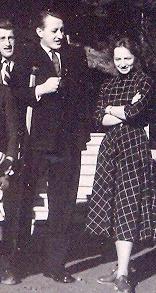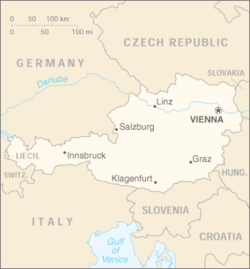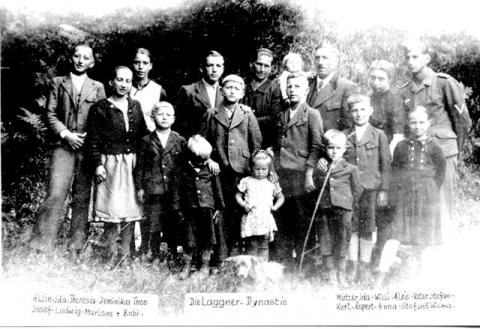Albin's Story

Albin's Story
In the photo above, Albin Laggner stands in center, utilizing a crutch under his right arm, next to his sister Wilma at right.
Albin Laggner was the 5th child of Stefan Laggner and Ida Gols Laggner, of Feicht, Lendorf parish, (Pfarre Holz), Carinthia. Wilhelm Kriessmann's home village of Feistritz im Rosenthal was in Carinthia also. Albin's birth date was 14 May, 1927, making him one year younger than Willy Wenger, of Leoben, Styria, who eventually married Albin's sister, Wilma.
After attending eight years of elementary school in Holz, Albin Laggner sought for an apprentice position as a cook or waiter. He found a place at the Hotel Reisch in Kitzbühel, Tyrol. Later, he was hired at the Europa Hotel in Bad Gastein, initially as elevator operator, later as a waiter.
In the autumn of 1944, at the age of 17 ½ years, Albin was drafted into the Wehrmacht. Reporting in early 1945, and after probably minimal training, he was assigned to an armored unit that was stationed on the Czech border near Cottbus. It was clear the end of the war was already approaching.
However, in March, Albin was seriously wounded. A grenade exploded into his upper left arm. He lost the entire arm, for which he was operated on two or three times in the hospital in Cottbus. While in the hospital, he was taken into Czech captivity.
On May 9, 1945 (fourteen days before his 18th birthday), the end of the war was declared, but the Czechs kept shooting at the German soldiers! In the following days, all the prisoners were driven to the streets and scorned by the Czech population. German soldiers were kicked, beaten and hit with rifle butts. The crippled and wounded were laid down on the street and continued to be beaten and kicked, also by hateful women. Albin was seriously wounded on his right foot at this time. They then brought trucks and Red Army tanks and these defenseless men were brutally run over. This is documented and some film of it was found and shown on the Internet.
In Albin's case, an old woman, feeling pity for the German-Austrian soldier because of his youth, reached for him and pulled Albin out of the way of the tank tracks. He thus escaped being crushed to death. He was placed in a Czech concentration camp, where he had the good fortune to meet a comrade from a neighboring parish Ragersdorf in Mölltal, Anton (Toni) Zraunig, who became like a guardian angel to Albin.
They thought about ways to escape the hell they were in and one lucky day they succeeded in walking away in the direction of home. Because of Albin's injured right foot, which had been given no medical attention, walking was very difficult for him. Yet they walked all the way from the Northeast Czech Republic to the southernmost part of Austria.

As Albin often told, when they came to uneven terrain, Toni had to actually carry Albin. Without Albin, Toni would have reached home quicker and without problems, but Toni would not abandon Albin. They had to endure a lot of trouble and hardship along the way, yet it was together that they arrived in Feicht, Lendorf parish, in September 1945, in an emaciated condition. Albin was badly wounded, tattered, ragged and hungry, but happy to have reached home. The friendship with Anton Zraunig kept, as is said in good German, forever.
As you might expect, Albin had big problems with his neglected injured foot until it finally had to be completely amputated to above the knee. Thus he lost both his left arm and his right leg. Albin was a victim of and witness to the crimes committed by the Czechs after the war was supposedly over.
Albin also developed a close friendship with his school friend Peter Lipp (Peter Lanzinger). Peter visited him regularly and there was a lot of singing on these occasions. Albin later moved with his brother Louis to Graz, they then went back to Bludenz in Vorarlberg and, finally, home again to Feicht. Albin then took an apartment in Klagenfurt, close to his sister Anna. Albin got to know a woman there who took care of his war wounds.
Albin died on 26 October 1976 in Klagenfurt at age 50, and was buried in St. Peter's, Holz. He never married. He was a good soul.
Composed by Carolyn Yeager, thanks to information received from Albin's brother Rupert Laggner and Wilma Laggner Wenger.
Below: The family of Stefan and Ida Laggner all together on Christmas 1944. Albin is at far left. At far right is Stefan Jr. in paratrooper uniform. In front of Stefan Jr. is Wilma, age 9. The handsome sturdy boy next to Wilma is Rupert, the 10th child. To the left of his mother and father (back row holding youngest) is Sepp Laggner, home on leave after having been wounded, wearing civilian clothers. Thus, the older three sons, in the back row, all served in the war. There are 15 children in all. (Click on picture for enlarged view)
Category
European History, Germany, World War II- Printer-friendly version
- 3741 reads










